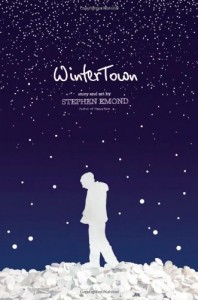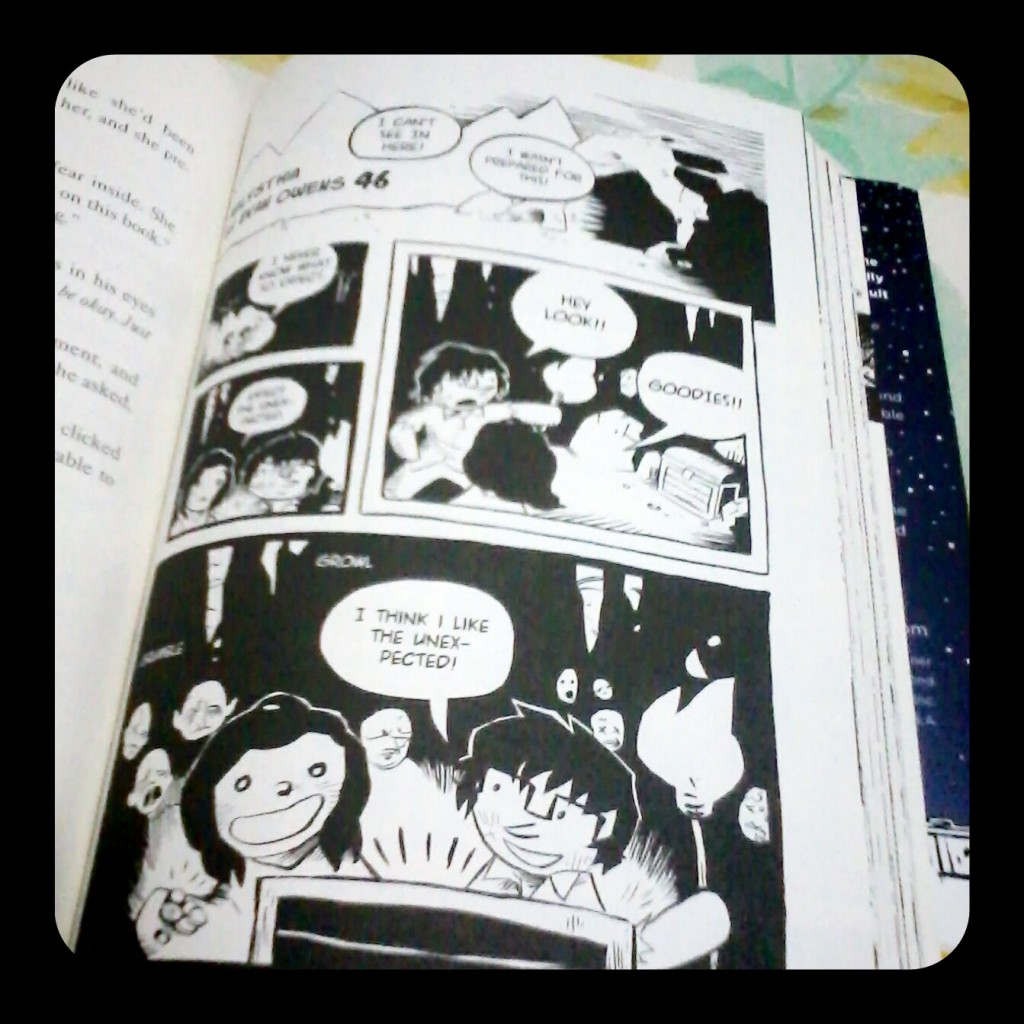 Winter Town by Stephen Emond
Winter Town by Stephen Emond
Publisher: Little, Brown Books for Young Readers
Number of pages:Â 336
My copy: hardbound, ordered from Book Depository
Every winter, straight-laced, Ivy League bound Evan looks forward to a visit from Lucy, a childhood pal who moved away after her parent’s divorce. But when Lucy arrives this year, she’s changed. The former “girl next door” now has chopped dyed black hair, a nose stud, and a scowl. But Evan knows that somewhere beneath the Goth, “Old Lucy” still exists, and he’s determined to find her… even if it means pissing her off.
Garden State meets Nick and Norah’s Infinite Playlist in this funny and poignant illustrated novel about opposites who fall in love.
* * *
Winter Town is one of my most anticipated reads of 2011, mostly because I loved Stephen Emond’s other novel, Happyface. It was one of my favorite contemporary novels in 2010, with drawings to boot! So I was really very excited when my copy finally arrived, and just in time for Christmas. Don’t you think the cover makes this book fitting for December? ((Of course, I forgot the book in the office during Christmas weekend, so I didn’t finish this until after Christmas.))
Evan and Lucy are childhood best friends. Evan is this straight-A, all-around good guy who has a seemingly perfect family even if his dad is pretty demanding and has too many high expectations with him. Lucy, on the other hand, is this confident girl who’s not afraid to say what she thinks and the brains behind all her and Evan’s crazy antics during their childhood. Lucy moves away one winter after her parents’ divorce, and they barely kept in touch, until Lucy tells Evan that he’s visiting. Evan’s world practically stops and he drops everything to be with Lucy, even with the risk of his dad’s wrath. But Lucy is not the same confident brown-haired girl that he’s known now. Lucy is now dressed as a Goth, is quiet, and swings from one mood to the other. Evan is confused, but he’s determined to make the Old Lucy come out, even if it means going to extreme measures. But the thing is, does New Lucy want Old Lucy back? Or maybe it’s all just Evan?
Winter Town is the kind of book that quietly creeps up on you because it’s so…normal. I mean, it is meant to be normal because it’s contemporary, but there are no too many flashy things about it save for the illustrations. There’s no love at first sight, or magic, or ya jock and an unpopular girl or a popular girl and a geek getting together. It’s just about…best friends. Who secretly pine for each other. But first they had to deal with the changes and issues between them that they do not want to deal with first in fear of rocking the boat. This story set in winter time in a New England town was just so shockingly normal that it feels like it’s a breath of fresh air.
If you’d allow me to digress a bit. In my Catholic community, I often heard people share about their life, and how God changed it. More often than not, the sharing usually comes from people whose life was in total disarray until they find God and then things start to get better because they get a different perspective. The people with more or less normal lives, the ones who do not come from as dark of a past as the others, often listen rather than share, because let’s face it: people who had to go through bigger things often have a bigger lesson to share compared to those whose lives are normal and okay. Reading Winter Town and getting to know the two main characters reminded me of that. The book is told in two perspectives, which I was pleasantly surprised to find out later in the book. On the normal side, there’s Evan — and when I say normal, I mean absolutely normal. Save for the fact that his dad gives him a bit too much pressure in school, and despite his grades, he has no idea where to go or what to do or what he wants to be in the future. He’s perfectly okay going with the flow because it’s easier than swimming against the current. And oh, how I related to Evan so much because I pretty much had the same life. Not that I’m complaining now, because I sort of know better now that I’m older, but my dear Evan, I know how it feels to be so lost in the normalcy. Lucy, on the other hand, is on the other side of the spectrum, at least when she shows up a year after she left. It’s been a bad year for Lucy and all she wants is to forget, but she makes a mistake of relying too much on the stability of her best friend so her own world would be stable. I couldn’t relate to Lucy but I wanted to hug her and tell her it will be better because she just seemed so sad. And when her problems were finally revealed, it really made me feel sorry for her, not because it was particularly earth shattering, but it’s just something that anyone should experience, especially with how I’ve gotten to know her with how Evan described Lucy. The differences of these two main characters make Winter Town easy to relate to, because I’m pretty sure we are all Evans and Lucys at some point in our lives (and maybe until now).
Like I said, the story was pretty normal but that doesn’t mean it’s too ordinary not to warrant enough attention. I liked how the author tackled some questions about being up front with your past and dealing with your problems rather than running away from them, finding out what you really want and going after them even if it means not doing what other people expects of you and of course, friendship and romance and the thin line between that. It’s about time someone deals with that, and I think Stephen Emond manages to do that quite realistically.
But the real highlight of Winter Town is really the illustrations. I wouldn’t expect anything less from someone who made me a fan of his work with just one book (and someone who generously drew me a picture of myself with a sunflower and books — look up at the banner!). I had to admit, I was expecting the book to be a little like Happyface, you know, sort of like a scrapbook/journal type of thing, so I was kind of surprised to see that it’s a prose with illustrations on the side. Which isn’t bad, of course. The illustrations were amazing, as expected, and they were a good complement to the text, especially because there were some times when I felt a little bit disengaged with the story. I guess I was kind of expecting an atmospheric read, something that would make me really feel winter as I read it ((Especially since it never snows here!)), but sometimes it didn’t really feel that way. There were times when I felt a little bit disconnected with the text, like I wish there would be a bit more description of the things happening and the places and the events, but then the illustrations would pull me back into the story. It makes me wonder now how the reading experience with the book be if the illustrations were removed. While I think the story will still be able to stand on its own, I bet it wouldn’t be as entertaining. Then again, removing the illustrations is pointless because Winter Town was made to be with illustrations. So…maybe I should stop nitpicking and just need to read more novels with pictures.
But enough blather. Overall, I liked Winter Town. While I wasn’t really as enamored with this as I was with Happyface, I still think Winter Town was still a very good read. It kind of breaks the mold of contemporary YA by…not really breaking it, if you get what I mean. I think that everyone will be able to find something to relate to in this book, whether you’re an Evan or a Lucy. The lessons of the story were pretty solid, and I really liked the ending: sweet, hopeful and open ended — just the way I like it. :)
Rating: [rating=3]
Other reviews:
Forever Young Adult
Midnight Bloom Reads



Lovely review, Tina! I need to make sure this book finds its way into my grabby hands!